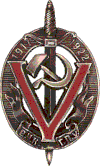VChK
| Всероссийская чрезвычайная комиссия Vserossiyskaya chrezvychaynaya komissiya |
|

Cheka badge circa 1922
|
|
| Agency overview | |
|---|---|
| Formed | December 20, 1917 |
| Preceding agency | |
| Dissolved | February 6, 1922 |
| Superseding agency | |
| Type | Secret police |
| Headquarters | 2 Gorokhovaya street, Petrograd Lubyanka Square, Moscow |
| Agency executive | |
| Parent agency |
Council of the People's Commissars |
Cheka (ЧК – чрезвыча́йная коми́ссия chrezvychaynaya komissiya, Emergency Committee, Russian pronunciation: [tɕɪˈka]) was the first of a succession of Soviet state security organizations. It was created on December 20, 1917, after a decree issued by Vladimir Lenin, and was subsequently led by Felix Dzerzhinsky, a Polish turned communist. By late 1918, hundreds of Cheka committees had been created in various cities, at multiple levels including: oblast, guberniya ("Gubcheks"), raion, uyezd, and volost Chekas, with Raion and Volost Extraordinary Commissioners. After 1922, Cheka groups underwent a series of reorganizations, with the NKVD, into bodies whose members continued to be referred to as "Chekisty" (Chekists) into the late 1980s.
In 1921 the Troops for the Internal Defense of the Republic (a branch of the Cheka) numbered at least 200,000. These troops policed labor camps; ran the Gulag system; conducted requisitions of food; subjected political opponents to secret arrest, detention, torture and summary execution; and put down rebellions and riots by workers or peasants, and mutinies in the desertion-plagued Red Army.
The name of the agency was originally "The All-Russian Emergency Commission for Combating Counter-Revolution and Sabotage" (Russian: Всеросси́йская чрезвычайная коми́ссия по борьбе́ с контрреволюцией и саботажем; Vserossiyskaya chrezvychaynaya komissiya po bor'bye s kontrrevolyutsiyei i sabotazhem), but was often shortened to "VCheka" or "Cheka," after its Russian initials. In 1918 its name was changed, becoming "All-Russian Extraordinary Commission for Combating Counter-Revolution, Profiteering and Corruption".
...
Wikipedia
